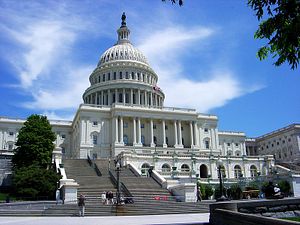On Thursday, the U.S.-China Economic and Security Review Commission released its annual report to Congress. The Commission was created in 2000 to monitor and report to Congress about the “national security implications of the bilateral trade and economic relationship” between the U.S. and China. Each year, the Commission submits a report to Congress that includes recommendations for congressional action. This year, the report included a number of recommendations that, if implemented, could overshadow the Obama administration’s efforts to keep U.S.-China relations on an even keel.
Historically, Congress has been fairly uninvolved in U.S.-China relations. Although many members of Congress adopt vocal positions regarding issues from human rights violations to the value of China’s currency, congressional opinion generally has little sway on executive actions. The 1979 Taiwan Relations Act, which provided for a continued U.S.-Taiwan relationship even after Washington normalized diplomatic ties with Beijing, is the notable exception to this general rule. Even during the high point of congressional and public outrage over the Tiananmen Square incident, Congress’ bid to deny China Most Favored Nation trading status was diverted by the Clinton administration, which eventually dropped the idea altogether.
Given this history, we should remember that the USCESRC report will not automatically translate into congressional action, much less have a lasting influence on the administration’s China policy. However, its recommendations do indicate areas of growing concern within Congress, and an increased desire for Congress to take whatever action it can to address perceived imbalances in the U.S.-China relationship.
Notably, the report discussed long-standing concerns over increased Chinese investment in the U.S. Chinese companies can face an uphill battle doing business in the U.S., due to both security concerns and worries that China’s economic policies give its firms an unfair competitive advantage. The report warned that allowing investment by state-controlled companies “risks creating a hybrid economy where privately owned U.S.-based businesses must complete with Chinese state-financed companies” that are motivated not by profit by but fiat from Beijing.
To address the issue, the report recommends that Congress direct the Department of Commerce to assume that Chinese “state-owned, state-controlled, or state-invested firms” operating in the U.S. are under the “direction of the [Chinese] state” unless proven otherwise. As the example of Huawei, the Chinese telecommunications firm, shows, it is nearly impossible for Chinese firms to prove to Congress’ satisfaction that they do not have inordinately close ties to the Chinese government. If acted upon, this recommendation could have a major dampening effect on Chinese investment in the U.S. at a time with Washington and Beijing are growing more serious about negotiating a Bilateral Investment Treaty.
The report also ups the ante on the on-going U.S.-China dispute regarding cyber espionage. The report recommends that Congress order the Department of Commerce and the Office of the U.S. Trade Representative to investigate whether existing mechanisms could be used to sanction Chinese companies “that benefit from trade secrets or other information obtained through cyber intrusions or other illegal means.”
In May, the U.S. Department of Justice indicted five PLA officers on charges of economic espionage, citing the men’s alleged involvement in a Chinese cyber espionage unit. At the time, some analysts suggested that, as the PLA officers will never stand trial, it would be more effective to directly penalize Chinese companies who had benefited from the theft of U.S. companies’ intellectual property. The USCESRC report suggests that Congress give serious consideration to this option by seeking to find ways the U.S. government can sanction firms alleged to have profited from cyber espionage.
The report said that, given the enormous benefits China reaps from economic espionage, such activities are “unlikely to be altered by small-scale U.S. actions,” implying that Washington must increase the severity of its response to encourage a change in Chinese behavior. Given the reaction from China to the ultimately toothless indictment of five PLA officers, the implementation of sanctions on Chinese companies (or another, more substantial actions aimed at curbing cyber-espionage) would undoubtedly bring about a severe response from China.
The report also calls into question the value of the Obama administration’s platforms for engaging with China. The report recommended that Congress ask the Government Accountability Office to update its report on the “effectiveness” of the U.S.-China Joint Commission on Commerce and Trade and the Strategic and Economic Dialogue. Doubts about the effectiveness of the S&ED are particularly troubling, as this forum (which brings together the top U.S. and Chinese officials for foreign and economic affairs) is the premier annual platform for high-level dialogue between the U.S. and China. The report also recommended that Congress ask the Pentagon to explain “its purpose and rationale” for “military-to-military engagement planning with the People’s Liberation Army,” suggesting that Congress should be skeptical about the recent warming in military-to-military ties.
For much of the past 35 years, U.S.-China relations have been under almost the exclusive control of the executive branch, for better or for worse. As issues in the U.S.-China relationship become more high profile, however, Congress will start wanting more of a say in how the bilateral relationship is handled. As the Commission’s report shows, that could force Washington to take a tougher stance toward China.

































